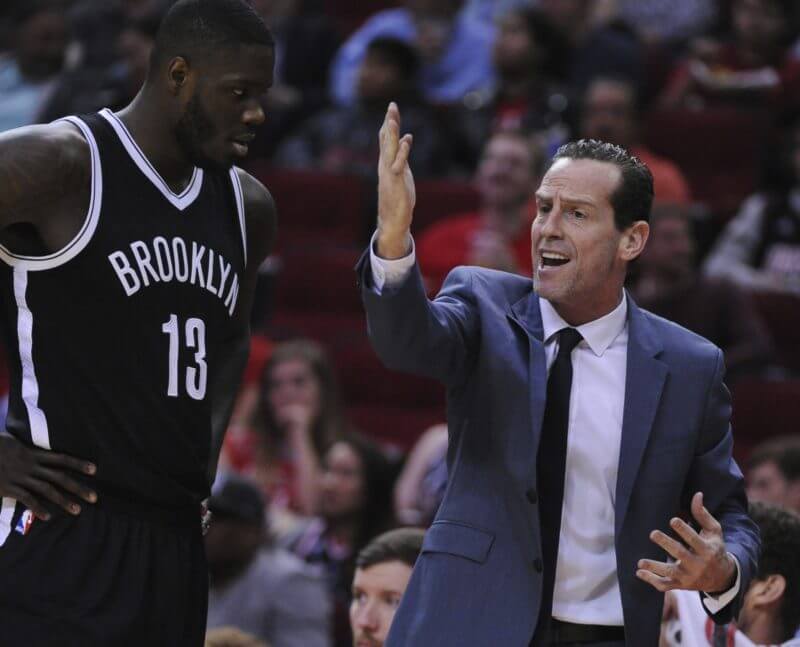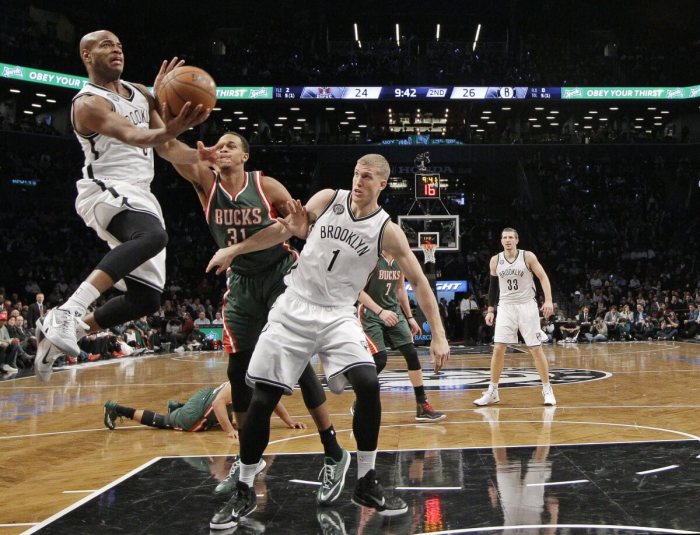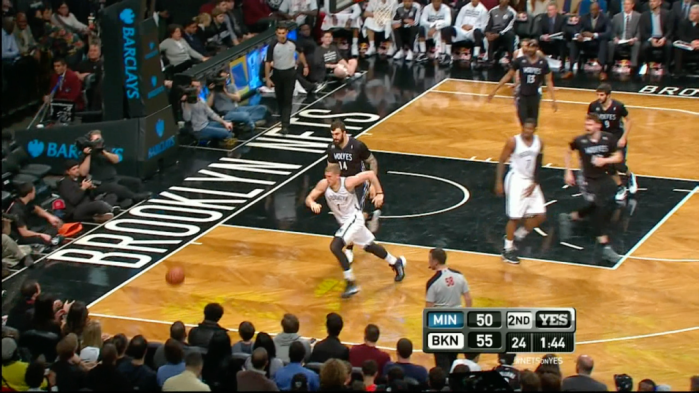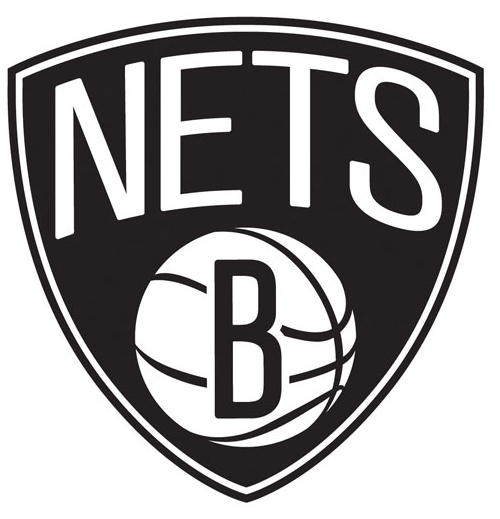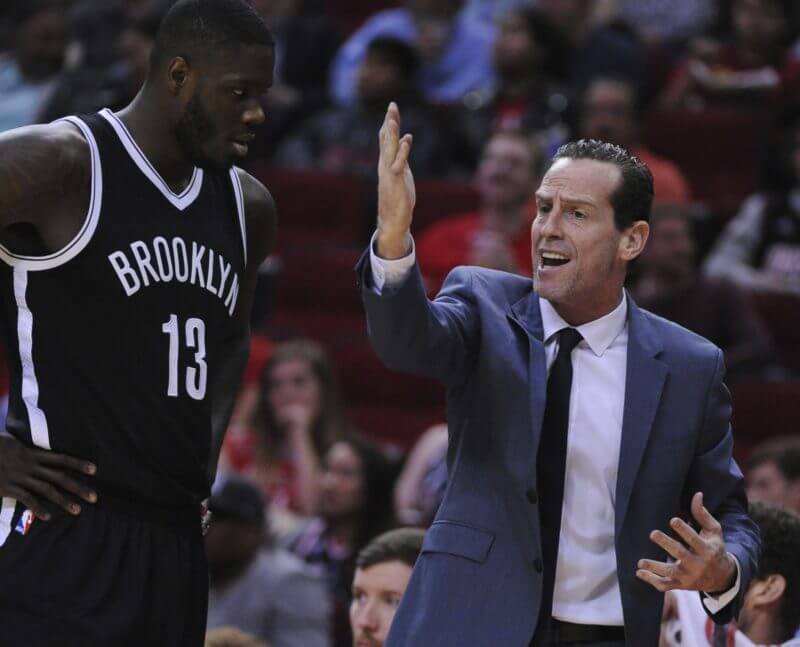
The Reclamation of Anthony Bennett
As far as the eye can see, Anthony Bennett was the perfect risk for the Brooklyn Nets to take on this summer — the former no. 1 overall selection in the 2013 NBA Draft had bounced around from team to team and nearly found himself out of the league completely until Sean Marks called him this summer. But for many, the signing of Bennett — at the minimum, mind you — was groan inducing: were the Nets that desperate?
Through just under a third of the season, the general public’s consensus on the power forward has been mixed, ranging from “Why is he still on this team?” to “Well, at least he’s better than Chris McCullough” — but there’s an argument that says the low-gamble signing has already exceeded expectations.
Wait, what?
OK — hear me out: bits and pieces of Bennett’s 18 games in 2016 have offered a new look at the once forlorn — albeit in just the tiniest of doses. Whether it’s his improved three-point shooting or renewed focus on the boards, there’s reason to believe that Bennett has more than enough time to become a solid rotation player in this modern NBA landscape — here’s why:
The Three-Point Shooting
Yes, small sample sizes, I agree — but Bennett has made strides in his deep shooting, an almost near-necessity for most NBA franchises these days, but for the Nets in particular. During his rookie season with the Cleveland Cavaliers, Bennett shot 13-53 from three-point range and, considering those around him at the time — Kyrie Irving, Luol Deng, Tristan Thompson, and Dion Waiters — it’s safe to assume that most of his attempts were of the wide-open variety, as seen in the video below:
This year, flanked by, arguably, worse talent, Bennett is already just two three-pointers away from setting a new career-high in a season, something that Kenny Atkinson and co. clearly see as a potential asset moving forward. He’s shooting it at just 27%, which is, uh, rough, but it’s been enough to mostly skip Luis Scola in the rotation and keep Chris McCullough with the Long Island Nets almost permanently, so it’s something that shouldn’t be ignored.
In an interview with ESPN’s Zach Lowe during the 2014 offseason, former head coach David Blatt remarked on Bennett’s remarkedly improved summer:
“The Heat had Shane Battier to guard power forwards so LeBron wouldn’t have to all the time. And Battier could shoot 3s. Can you envision Anthony Bennett as sort of a bigger Battier in that same role?
I’m really happy with the way Anthony has come to our camp. He’s worked extremely hard, has improved his body, has improved his approach. He’s maturing. He’s on the right track. We’re gonna see what we can do with him.
But does he fit that Battier role?
I think that’s a pretty fair assumption.”
About a month later, the Cavaliers swapped him and Andrew Wiggins for Kevin Love, which has worked wonders for them — but what about Bennett? What about those Shane Battier-esque comparisons?
With the Minnesota Timberwolves, Bennett’s training wheels were taken off completely as he averaged a career-high 15.7 minutes per game — however, his three-point attempts dropped tremendously. With Kevin Martin, Mo Williams, Gary Neal, and Chase Budinger — all players that have made a living from behind the arc — posting up deep, there was virtually no reason for Bennett to be there.
In fact, the late Flip Saunders explicitly disallowed Bennett to develop a major part of his game — he shot 38% in his one season at UNLV. Just one day after the Cavaliers-Wolves trade:
NBA trend for PFs is to try to develop stretch-4s. Flip, on Anthony Bennett shooting 3's: "We're not letting him do that here." Oh, goody.
— Ross Marrinson (@RossMarrinson) August 25, 2014
And, if we’re willing to look past the nightmarish stint with the Toronto Raptors in 2015-2016, in which Bennett averaged 4.4 minutes over just 9 games before lingering in the D-League and eventually getting cut outright, then there’s reason to be optimistic.
For his career, discounting the Raptors, he’s still hitting from deep at a 27% rate, putting him solidly in the conversation with players like Frank Kaminsky (29%), Kent Bazemore (29%), Nikola Mirotic (28%), and Marcus Smart (27%), all of whom are greatly relied upon to hit those shots. Again, it’s not a career-saver, but there are signs of life, albeit faint.
The Hustle + IQ
Here’s a huge one for Bennett, and it’s one that nearly doomed him right of the gates — his in-game effort and intelligence. From a feature on Bennett in 2015, it’s Lowe again that provides the analysis:
“Boil Bennett’s career into one clip, and it would be him screening, lazily fading to the dead zone just inside the 3-point arc, catching a pass, hoisting a moon-shot jumper, and jogging back on defense after it misses. Two minutes later, he’d be jogging back to the bench, another aimless shift in the books.
[. . .]
Bennett’s defense has been a horror show of mistakes, miscommunications, and shoddy effort. He lives in no-man’s-land. He arrives too late, or too soon, calls out screens as they’re already happening, and can’t sort through all the decisions he has to make in a few seconds.
At times defending the paint, he has looked tentative, and almost sad. He has long arms and some bounce, but he just hasn’t been up for the fight down there consistently enough. He has the mobility to give you a good first effort, but when the scrum starts to boil, Bennett sometimes just wants out. Every advanced metric on his defense, both public and private, is beyond awful, and that matches the eye test.
That’s the first thing Bennett has to change: try hard, every goddamned possession.”
And there was this:
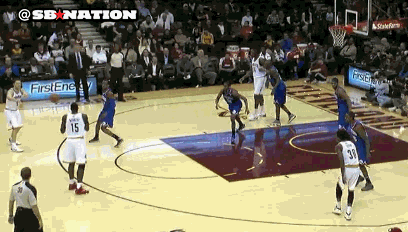
Hoooooo, boy.
So, what’s changed?
For one, a renewed focus and commitment to the hustle play, something that was conspicuously missing through the first 100-or-so games of Bennett’s career. Unsurprisingly, there isn’t much in the way of video evidence here, but compare this Sean Kilpatrick alley-oop to the failed pick above, the difference is amazing, isn’t it?
Additionally, writers and coaches alike had harped on Bennett’s lackadaisical defense and inability to analyze the game as it unfolded, all culminating in this damning chart by SB Nation’s Drew Garrison:
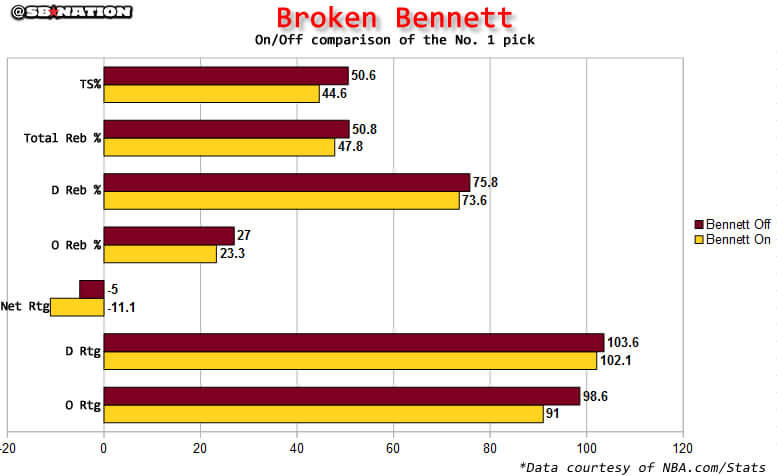
Few players can lay claim to being a detriment on both sides of the ball, but during his rookie year, Bennett had that covered. As pundits guessed, it was a combination of Bennett’s sky-high expectations and low game IQ that doomed him from the start. Whether that meant not rotating quickly enough on a switch, or not immediately knowing what to do with the ball when he received it, the fans quickly tired of Bennett and he, ultimately, gave up trying to please them.
(Thanks to 3Ball for the video clips!)
On the flip side, check out this garbage time effort against the Chicago Bulls last month as Bennett takes the roll right into the lane and up for an uncontested dunk — all without hesitation, I might add. In year’s past, we’d seen a version of Bennett that tried to count cards instead of just simply knowing his odds. With less second-guessing and more action, glimpses of Bennett’s potential have peaked out from below more often than not.
The conclusion is clear: this is a man that knows this could be his last opportunity at an NBA job if things go awry once again. Whether that’s a testament to Atkinson’s coaching — certainly a factor — or Bennett’s realization that he’s only got an aging, nearly phased out Scola ahead of him on the depth chart, there’s reason to believe that whatever attitude issues he had are long gone. Not only that but the Nets are playing to his strengths, something that both the Timberwolves and Raptors were unwilling to do while he was on their rosters.
In 2013-2014, Bennett’s gem of a woeful rookie campaign came in a 19-point, 10-rebound effort against the Sacramento Kings. The following year with the Timberwolves, there was a career-high 20-point barrage, but it was only accompanied by a 3-rebound line. The most rebounds he’s ever had in a game is 11 — well, that was until his 14-count explosion against the Milwaukee Bucks earlier this month. With the Cavaliers, he hit a career-high 3 three-pointers once in a game, but hit 2 or more in a game just twice more; but with the Nets, he’s already hit 2 three-pointers 3 times — simple math tells you that a new career-high is right around the corner.
In Saunders’ indication to make Bennett a more normal, classic power forward, he may have set the already fragile (remember, he was booed as a rookie!) no. 1 over pick back even further because, at his core, he’s not a normal, by-the-book player by any means. While that’s not to say Bennett has some wild, untapped potential that only Atkinson was smart enough to see, the Nets have made an attempt to give his game back to him and, so far, that’s made all the difference.
The Patience
It should come as no surprise, but being patient isn’t a strong suit used to describe Nets fans and when Archie Goodwin was cut by the Phoenix Suns this fall, many deduced that it would be Bennett’s head to roll. After a short stint with the New Orleans Pelicans, Goodwin is back in the D-League while Bennett continues to earn time off the bench in Brooklyn.
This patience and willingness to see something out is new for the Nets, particularly so in the Brooklyn era. And, for once, Bennett is paying back that patience in spades — well, insofar that he’s providing quality minutes off the bench at a bargain.
Think about it this way: after a year of subpar basketball — a jump few rookies make immediately, much less at 19-years-old — Bennett a toss in for the Wiggins-Love deal. Once there, his head coach took away the one (decent) facet of Bennett’s game, the three-point shot, since, of course, one cannot make a living off of tip-dunks and energy plays forever.
When it came time to swallow Bennett’s final year at 3.6 million, the Timberwolves balked, cutting him in lieu of Kevin Garnett, Tayshaun Prince, and Andre Miller, all 35 years of age or older. With Toronto, a failed experiment from the start, Bennett was half signed under the false pretense of a Canadian reunion tour, but with the Eastern Conference crown in sight, he never stood a chance.
Now, with the Nets, Atkinson has committed to giving Bennett a chance he hadn’t seen since his rookie year: opportunity. Marks’ faith in youngsters like Sean Kilpatrick, who toiled away in the D-League for much of his career before the new general manager rescued him last season, and Atkinson’s steadfastness in Isaiah Whitehead, who the Nets handed the keys to the car to after Jeremy Lin and Greivis Vasquez’s injuries, have proven that the Nets are here for long haul.
No shortcuts, no haphazard roster cuts, and, most importantly, belief in the players and system they built this summer, even when injuries threaten to destroy the foundation from the inside. Of course, Bennett could very well not reach the heights of Kilpatrick — who has suddenly carved out a niche as one of the NBA’s top scorers off the bench — but the Nets would be damned it they didn’t give it a fair shake.
Thus far, Bennett is returning that faith in kind whenever he can.
The Price
And, finally, it’d be remiss not to mention the bargain-basement price that Bennett is under contract for, another calling card of the Marks + Atkinson duo. Admittedly, part of the reason why the Timberwolves opted for the veteran presence over Bennett’s remaining potential remains obvious: money. On a team that had to pay Garnett, Nikola Pekovic, Ricky Rubio, and other high-value contracts, there wasn’t much room to carry flotsam.
But at exactly 1,015,696 in 2015-2016, is it that outrageous to call Bennett a steal right now?
Other players making ~about that much include Willie Reed, Thomas Robinson, Brian Roberts, Jeff Withey, Ian Clark, and Justin Holiday. If not for the Pelicans’ Terrence Jones (10.4 points, 6.1 rebounds), there are few on that list worth rolling the dice on instead of Bennett.
His per 36 averages, a dangerous game, I know, are at 15.7 points and 10.5 rebounds per game, but on a team like the Nets, there are certainly more minutes to be earned versus the likes of Justin Hamilton, Trevor Booker, and Luis Scola.
Oh, and just for giggles, the other players averaging 10 rebounds or more are Tristan Thompson, Russell Westbrook, Kevin Love, DeMarcus Cousins, Nikola Vucevic, Karl-Anthony Towns, Anthony Davis, Rudy Gobert, Tyson Chandler, Marcin Gortat, DeAndre Jordan, Andrew Drummond, Dwight Howard, and Hassan Whiteside.
A false equivalency for sure, but of that list, Gortat is the lowest-earning player (other than Towns, of course) and he’s making an outrageous 12 million with the Washington Wizards this season.
For Bennett, even with his shortcomings elsewhere, is just 23-years-old, so there’s still plenty of time and opportunity for this power forward to finally bloom under Atkinson’s faith. But, perhaps more than anything, at a paltry 1 million, Bennett has nearly outplayed his contract value already.
And with the Nets, that’s all you can hope for as they build towards an eventual future.

